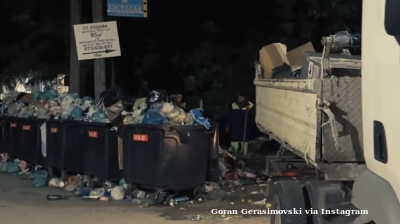The Biden administration has temporarily frozen approvals of all new licences for the export of US LNG to assess their environmental impact in a move that could disrupt global energy markets.
“Today, the Biden-Harris Administration is announcing a temporary pause on pending decisions on exports of liquefied natural gas (LNG) to non-FTA countries until the Department of Energy (DoE) can update the underlying analyses for authorisations,” the White House said in a statement. “The current economic and environmental analyses DOE uses to underpin its LNG export authorisations are roughly five years old and no longer adequately account for considerations like potential energy cost increases for American consumers and manufacturers beyond current authorisations or the latest assessment of the impact of greenhouse gas [GHG] emissions.” The freeze allows time for an assessment that will take several months and then will be open to public comment which will take more time, Energy Secretary Jennifer Granholm told reporters on January 26. The entire process is likely to push any final decision on restarting export licences to beyond the November 5 presidential poll.
Biden said in a statement: "During this period, we will take a hard look at the impacts of LNG exports on energy costs, America's energy security, and our environment…The pause "sees the climate crisis for what it is: the existential threat of our time," Biden added.
The decision could reshape the energy landscape in the months leading up to the US presidential election slated for November. Since the war in Ukraine started, global energy markets have been dramatically remade and the newly commoditised LNG exports have come to play a crucial role in the redirected energy supply routes. However, as a young industry, global production of LNG is still not enough to completely meet the new demand from the missing piped gas.
Biden officials said despite the freeze, the decision would not hurt partners, as it has an exemption for national security should partners need more LNG.
“The US is already the number one exporter of LNG worldwide – with US LNG exports expected to double by the end of this decade. At the same time, the US remains unwavering in our commitment to supporting our allies around the world. Today’s announcement will not impact our ability to continue supplying LNG to our allies in the near term,” the White House said.
Europe and Japan are both heavily dependent on LNG imports and have both complained that the US decision to freeze exports growth will affect their economies. After the destruction of the Nord Stream 1 & 2 pipelines last year, Europe has replaced most of the 150bn cubic metres of imported Russian gas with 130 bcm of imported LNG in 2022. And Europe and Asia are increasingly in competition for the limited supplies of the supercooled gas supplies.
Last year, roughly half of US LNG exports went to Europe, and the US has worked with the EU to successfully economise consumption and manage its storage to ensure that “unprovoked acts of aggression cannot threaten its supply”, according to the White House.
In 2022, the EU and US pledged “to work toward the goal of ensuring additional LNG volumes for the EU market – with the US exceeding our annual delivery targets to the EU in each of the past two years,” the White House said in its statement.
A spokesperson for the European Commission highlighted the exemptions built into the order and told Reuters: "This pause will not have any short- to medium-term impacts on the EU's security of supply." The Biden administration said the strategic moratorium will allow the government ample time to evaluate the broader implications of increasing LNG exports on the nation's economy and its environmental commitments. Analysts say it is also a crowd-pleaser ahead of this autumn’s poll, burnishing Biden’s green credentials.
The move comes as the US was planning to significantly expand its LNG production; it recently overtook Qatar to become the world’s biggest exporter of LNG. Qatar is also planning a major increase in LNG projection with the planned North Field expansion that could come online in 2025.
The US decision to freeze the issue of export licences could last for several months, Bloomberg reports, while the election race is on and is part of Biden's broader energy platform, addressing the growing concerns of climate-conscious voters whose support is deemed crucial for the administration's aspirations for a second term in office.
The decision is seen as a tactical election gambit and the licences are likely to be reinstated once the voting is over. It is a deliberate effort to defer contentious energy debates until after the elections on November 5.
The administration's cautious stance on LNG is part of a broader pattern of delays concerning key energy projects and regulations.
High-profile initiatives such as the future operations of Energy Transfer LP's Dakota Access Pipeline and the establishment of criteria for carbon dioxide pipeline regulation and hydrogen production tax credits are also likely to see postponements, reports Bloomberg.
The Dakota Access Pipeline, which transports crude oil over 1,900 km from the Bakken fields to Illinois, has been under scrutiny due to environmental and indigenous rights concerns. Despite a federal court mandate for a thorough environmental review, the US Army Corps of Engineers has yet to define a clear path forward for the pipeline, leaving its fate uncertain.
Similarly, the debate over the hydrogen tax credit, pivotal for the burgeoning hydrogen energy sector, has been extended into the next year. The delay stems from a clash between environmentalists demanding strict production standards and industry proponents advocating for more lenient regulations to foster growth.
The announcement of the LNG permit freeze was met with jubilation among climate activists in Washington, with crowds proclaiming: "When we fight, we win." But the announcement was met with consternation by US partners dependent on US LNG exports. The last review of LNG export projects was in 2018, when export capacity was 113.27mn cubic metres per day. That capacity has tripled and is set to shoot higher by 2030 with projects under construction.
Environmentalists and youth groups that make up part of Biden's base have protested against the rapid expansion of the US production of oil and gas in the last decade. The US has concurrently been a key player in the global climate debate but at the same time has emerged as the world’s biggest producer and exporter of hydrocarbons.
Only four projects with export approvals pending at the DOE will be directly affected by the freeze, an administration official told Reuters without naming them. The projects could include ones by Sempra Infrastructure, Commonwealth LNG and Energy Transfer, the DOE's website showed, according to Reuters.
bneGREEN

TEHRAN BLOG: 200 days without rain
Tehran's water crisis is about decades of chaotic urban expansion, unregulated groundwater extraction, and infrastructure so decrepit that hundreds of millions of cubic metres vanish before reaching a single tap.

The Arctic and Antarctica record "off the charts" heat as polar warming accelerates
Parts of both the Arctic and Antarctic have experienced historically high temperatures in recent weeks, with weather stations in East Antarctica recording record-breaking warmth for the month of October, alarming climate scientists.

Giant glacier chunk breaks away in Tajikistan, mountain villages put on alert
Situation serves as reminder that climate crisis threatens to wreak havoc in Central Asian country.

Singapore’s green pivot – headline grabbing but still limited
Forays into offshore wind via regional cooperation with neighbours, and forward-looking bets on hydrogen and low-carbon fuels are making headlines, but the scale required to wean a heavily gas-dependent system off fossil fuels is still daunting.




